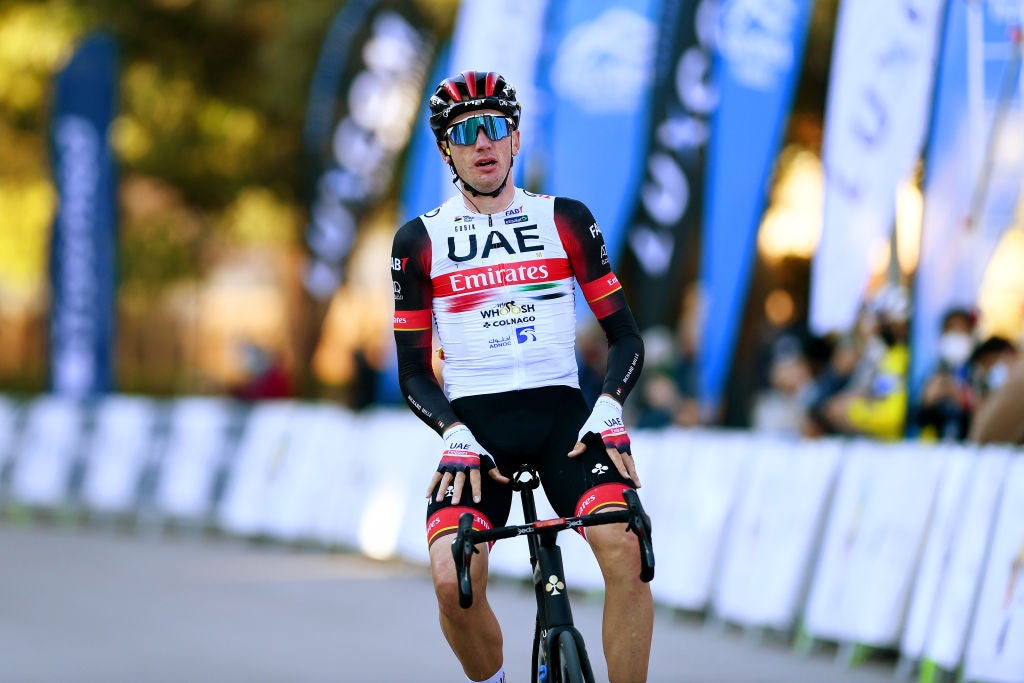Brandon McNulty still feeling effects of Liège crash at Tour de Romandie

PALMANOVA, SPAIN - JANUARY 26: Brandon Mcnulty of United States and UAE Team Emirates celebrates winning during the 31st Challenge Ciclista Mallorca 2022, Trofeo Calvia a 154,7km race from Peguera to Palmanova / #ChallengeMallorca / on January 26, 2022 in Palmanova, Spain. (Photo: Tim de Waele/Getty Images)
LAUSANNE, Switzerland (VN) — Brandon McNulty (UAE Team Emirates) first port of call after completing the Tour de Romandie prologue was to gingerly make his way onto the team bus and seek an audience with the team doctor.
The American, still feeling the effects and missing chunks of skin after a high-speed crash at Liège-Bastogne-Liège two days prior, made it through the opening day of racing in Switzerland, losing only 17 seconds to prologue winner Ethan Hayter and taking 16th at the line. Overall it was a satisfactory position given the gravity of the crash last Sunday that also saw the 24-year-old go through the concussion protocol after sliding along the tarmac with his helmet the only thing between his head and the ground.
Also read: Tour de Romandie stage win is ‘confirmation of what I’m capable of,’ says Hayter
When he climbed off the team bus to talk to VeloNews on the outskirts of Lausanne, Switzerland, the American gave an honest overview of his ride.
“It was alright. I’m not feeling myself after the crash though. Hopefully, the form goes up as the week goes on,” he said.
“It’s all skin. Luckily I had no bones broken and my head was OK. It was a lot of skin. I slid on my helmet and it had some scratches but we did the protocol and everything. It checked out and I’m OK.”
“I’ll try and ride into it. I had to do what I could but in the corners, you’re never as fast after a crash like that. The legs aren’t as good but they were actually better than expected. Hopefully, I can survive the next couple of days and then start to come good again as the race gets harder.”
McNulty wasn’t the only faller in Liège-Bastogne-Liège with dozens of riders hitting the deck with just under 60km to go. Julian Alaphilippe is still in hospital as a result of the injuries that he sustained and there have been several voices sharing concerns over the incident and how it will keep happening in professional cycling due to a set of circumstances. One rider told VeloNews that data and software that is fed to riders only heightens nerves and the fight for position at the front of the peloton whenever an important pinch point approaches. Other riders have brought the disc brake argument into play, while there are regular contributors who claim that younger riders take more and more risks.
“We were going about 80kph and guys were flying everywhere,” McNulty told VeloNews.
“There was nothing I could do, there was nowhere to go. I feel like I’m on the side of being a more cautious rider. You take the risks when you need to but some guys are always pushing. You have a lot of data in your ear when you’re on the bike but I don’t know what the answer is to solve this but it can be crazy out there.”
Asked if racing had become more dangerous since he moved into the WorldTour, the UAE rider reflected on the differences between U23 and top-level races and the intricacies of racing on larger and smaller teams.
“It’s hard to say because in the junior and U23 races it’s crazy for different reasons, and then when you do these WorldTour races for a team like Rally it’s almost a different sport because you don’t have the respect from the teams and you’re not fighting to be that the front because you’re just surviving. I think that some days are really crazy,” he said.
“It’s up to the riders to agree to be cautious, but that takes 100 percent of the peloton to agree and that’s not easy. You can let up but then one guy wants to be at the front and that just causes danger again.”
The Tour de Romandie, however, remains a key race on McNulty’s current program. Although there are understandable questions over his condition and form, the American is hoping to improve his standing in the second half of the race, especially with the event concluding with an uphill time trial on Sunday.
The crash at Liège-Bastogne-Liège aside, McNulty admitted that this season’s main struggle had come down to illness that had forced him to skip the Tour of the Basque Country in early April after a promising start to the season, in which he had won three times and finished second overall at the Volta ao Algarve.
“This was a key objective but after Paris-Nice I had COVID, so Basque was out. Then coming back from COVID, I think that I was starting to ride well but then Liège it was a big crash, which was another setback. Hopefully, the form is still there and it just needs a few days to come out. We’ve got good cards to play,” he said.
“Almost every rider has had to have a reset at one moment. It’s been quite a year, especially as we’ve had COVID the last couple of years but now we’ve had all these other illnesses starting to show up. It’s a minefield that you’re trying to make your way through.”